When it comes to city passes and travel cards, it’s usually fairly easy to figure out whether they would be worth it for you or not. For things like the Paris Pass or London Pass, they have a list of the most popular attractions and how much they cost, right there for you to see. The Swiss Travel Pass, however, is shrouded in mystery, or at least it was until I spent several days tracking down all of the prices and benefits.
A great many of the visitors and commenters on my popular page about where to go in Switzerland on a short visit are wondering whether the Swiss Travel Pass is a good deal. Embarrassingly, I’ve always had to answer that I found the pass too confusing to confidently advise people on. Now that has all changed, after literally days of research.
Note: This article was last updated in February, 2024.
Disclosure: This is a reader-supported website and some of the links are affiliate links where a small commission is paid to help keep this site going, but the cost to visitors is the same. The Swiss Travel Pass seems quite expensive at first, so it felt like it might be hard to get your money’s worth out of it. As it turns out, it’s pretty easy to get good value, and it’ll be a good deal for many visitors.
New in 2024
Prices increased an average of 5.9% from 2023 on the Swiss Travel Passes, but the Half Fare Card remains at CHF120, which is where it’s been for many years. Train fares in the country increased by similar percentages so the value is basically unchanged. There were no other notable changes to service or the included attractions and train routes.
>>>Buy the Swiss Travel Pass online
Where to stay in Interlaken and the Lauterbrunnen Valley
Since most people reading this will be visiting the Interlaken area and I get so many questions about it, I decided to write a detailed guide on which area to stay in while visiting this area.
>>>Where to stay in Interlaken or the Lauterbrunnen Valley in Switzerland
I included many huge photos in that post so readers will be able to get a better idea of what each place looks like and they are worth a look by itself.
>>>Lucerne or Interlaken: Which to visit and how long to stay?
The article just above will help you decide on how long to spend in each of Switzerland’s two best tourist areas.
Are you 100% sure where you want to go in Switzerland? This should help
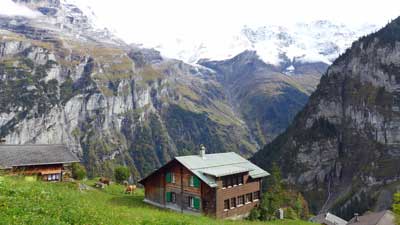
Zurich and Geneva are pleasant but dull. The good news is that Switzerland is packed with amazing sights and none of them are the big cities. If you aren’t 100% locked in yet, please read the article below and I think you’ll enjoy it.
Is the Swiss Travel Pass a good deal? Here's the short version
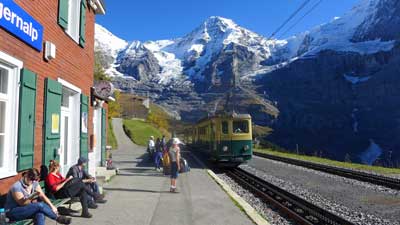
The bottom line is that the scenery, train journeys, and cable car rides in Switzerland are stunning and not found anywhere else in the world. They are also quite expensive if you pay for them one at a time. So no matter how you visit Switzerland, you are going to be paying quite a bit, or skipping the absolute best things that you’ve come there to see.
With good planning it’s quite easy to get great value out of a Swiss Travel Pass, but it might be a poor choice for those who don’t like to plan ahead. You can easily do a scenic train ride and a cable car in the same day, and still have time to do a scenic hike in the process.
First class or second class? Good news for most people
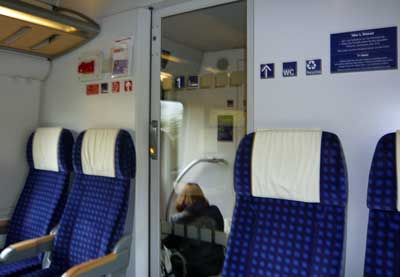
That said, Swiss Trains are literally the nicest in Europe and even the Second Class seats and carriages are nicer and roomier than trains in neighboring countries. The First Class seats are larger and nicer with only 3 across the cabin instead of 4, but honestly Second Class is perfectly comfortable for almost everyone.
Again, First Class on European trains like this is generally popular with business travelers where the company is paying and they need to get work done during the ride, and also senior citizens who don’t want to worry about a carriage full of backpackers. For most of the rest of us, Second Class is more than comfortable enough and the seat width and legroom compare to business-class airline seats. I’m a big and tall guy and I almost always travel in Second because it’s plenty comfortable enough and all the seats arrive at the same time anyway.
The longer you'll be in Switzerland, the better deal a Swiss Travel Pass will be
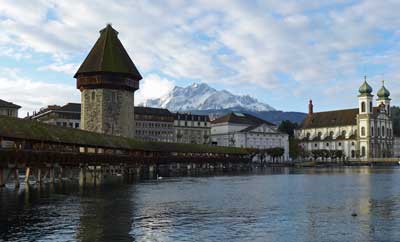
In other words, if you are staying 5 days or fewer, you have to do the math to determine your best option. But if you are spending even 6 or 7 days in Switzerland then the 6-day or 8-day Pass is almost guaranteed to be a great deal and your best choice. Once you have a Swiss Travel Pass you’ll absolutely love the ability to just hop on any train (excellent trains, always on time) and most boats and cable cars without having to worry about the cost. The per-day cost of an 8-day Pass even if you only use 6 of those days is about CHF65, and Switzerland is filled with amazing train rides and boats and cable cars that can get you that much value before noon each day.
Schilthorn (50% discount) and Jungfraujoch (25% discount) are cheaper with a Swiss Travel Pass
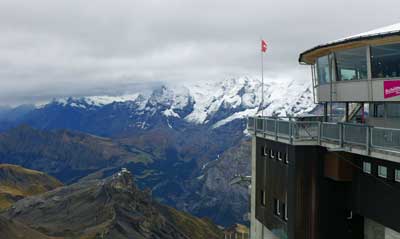
Both of those peak experiences are extraordinary and different from each other. Even so, compared to Jungfraujoch, Schilthorn is also faster and more comfortable on the way up and down. You can enjoy an excellent visit to Schilthorn in 4 hours or so (or a bit longer if you eat at the spinning Piz Gloria restaurant at the top), while a visit to Jungfraujoch requires closer to 6 hours.
NOTE: Schilthorn closes for maintenance for a week or two in late November most years.
Consider the Swiss Half-Fare Card instead
If you AREN’T going to be doing two or more of the long (and expensive) scenic train trips, you will get much better value out of the Swiss Half-Fare Card, which is explained a bit below.
Mt Rigi, near Lucerne, is 100% covered by the Swiss Travel Pass
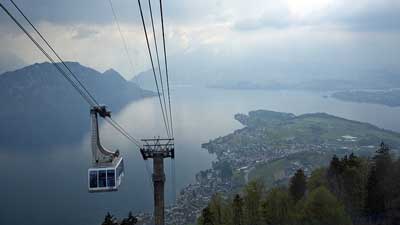
Is a Swiss Travel Pass right for you?
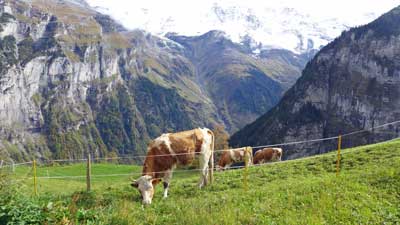
Most people only visit Switzerland for 5 or 6 days at most, so the 3-day and 4-day passes are the ones to focus on. But if you are staying for 8 days or more, those longer passes are almost certainly a great deal for you.
Long story short, if you plan on doing 2 of the more expensive scenic trains and the Jungfraujoch railway or the Schilthorn cable car, then the pass will save you money. Switzerland is expensive, but it’s worth it, and the travel pass can help make it a bit more affordable.
What the Swiss Travel Pass includes
- Free rail travel on normal trains and most scenic trains
- Discounted travel (about 50%) on popular tourist mountain trains
- Discounted travel (about 50%) on popular tourist cable cars
- Free travel on public transport in 75 towns and cities
- Free entry to around 500 museums in Switzerland
The Swiss Travel Pass covers the fare on the most popular scenic and panoramic trains. You can choose a normal seat in a regular carriage for no additional cost, but there is a supplement of CHF8 to CHF49 for a reserved seat in one of the special panorama carriages on these routes.
Prices of the 2024 Swiss Travel Pass
1st Class
- Adult 3-day Pass: CHF389
- Youth (4 to 25) 3-day Pass: 274
- Adult 4-day Pass: 469
- Youth (4 to 25) 4-day Pass: 330
- Adult 6-day Pass: 602
- Youth (4 to 25) 6-day Pass: 424
- Adult 8-day Pass: 655
- Youth (4 to 25) 8-day Pass: 469
- Adult 15-day Pass: 723
- Youth (4 to 25) 15-day Pass: 512
2nd Class
- Adult 3-day Pass: CHF244
- Youth (4 to 25) 3-day Pass: 172
- Adult 4-day Pass: 295
- Youth (16 to 25) 4-day Pass: 209
- Adult 6-day Pass: 379
- Youth (16 to 25) 6-day Pass: 268
- Adult 8-day Pass: 419
- Youth (16 to 25) 8-day Pass: 297
- Adult 15-day Pass: 459
- Youth (16 to 25) 15-day Pass: 328
Swiss Travel Pass Flex
This version costs a bit more, but you don’t have to use the travel days consecutively. It’s a great option for anyone who won’t be taking longer train rides each day.
- Adult 3 Flex days in 1 month (1st Class): CHF445
- Adult 3 Flex days in 1 month (2nd Class): 279
- Adult 4 Flex days in 1 month (1st Class): 539
- Adult 4 Flex days in 1 month (2nd Class): 339
- Adult 6 Flex days in 1 month (1st Class): 644
- Adult 6 Flex days in 1 month (2nd Class): 405
- Adult 8 Flex days in 1 month (1st Class): 697
- Adult 8 Flex days in 1 month (2nd Class): 439
- Adult 15 Flex days in 1 month (1st Class): 755
- Adult 15 Flex days in 1 month (2nd Class): 472
Where to buy the Swiss Travel Pass
The Swiss Half-Fare Card – A better option for many visitors
Far less confusing than the Swiss Travel Pass, you can instead get a Swiss Half-Fare Card, and it will be a better deal for many travelers. The price is lower and it’s much easier to do the math, and the discounts are greater on some things as well.
- Swiss Half-Fare Card for 30 days: Adults – CHF120 or US$129
What you get:
Those who buy the Swiss Half-Fare Card will get 50% discount on all trains, buses, and boats in Switzerland for up to 30 days, as well as 50% off all public transportation in 75 cities and towns.
>>>Buy the Swiss Half-Fare Card
Why the Half-Fare Card is a better deal for many
While the Swiss Travel Pass is a great deal for those doing many of the expensive scenic journeys and mountain sights within a few days, it’s not good value for those who are doing fewer of the expensive trips and/or those who are staying longer. Also, the Swiss Travel Pass only provides a 25% discount on the amazing Jungfraujoch Railway, which costs between CHF120 and CHF224 return depending on your starting point, while the Half-Fare Card provides a 50% discount.
The math is simple as well. You can just add up the cost of the trains, boats, and buses you’ll be taking while in Switzerland, and if the total is more than CHF240 or so, the Half-Fare Card will save you money.
Example itinerary:
- Zurich to Interlaken train (2nd Class): CHF50
- Schilthorn Cable Car: CHF112
- Jungfraujoch railway from Interlaken: CHF205
- Interlaken to Lucerne train (2nd Class): CHF33
- Mt Rigi roundtrip from Lucerne: CHF84
- Engelberg (near Lucerne) to Mt. Titlis Cable Car: CHF92
- Lucerne to Zurich train (2nd Class): CHF25
Total per person: CHF601
Total with Half-Fare Card (including price of card): CHF420.50
It would be tough to do all of those things in 4 days, although it is possible. If you bought a 4-day Swiss Travel Pass here is how it adds up:
4-Day Swiss Travel Pass: CHF259
Supplements for Schilthorn, Jungfraujoch, and Mt. Titlis: CHF203.25
Total cost: CHF462.25
Bottom line on the Swiss Half-Fare Card
Since the Half-Fare Card lasts 30 days and provides a larger discount on Jungfraujoch, it is better value for visitors who want to include that scenic top-of-Europe rail journey on their trip. The discounts also add up more quickly on Schilthorn and Mt. Titlis trips, just to name two examples, and you don’t have to take many longer rail journeys to get value out of the Half-Fare Card.
Swiss Saver Day Pass (A one-day unlimited travel pass)
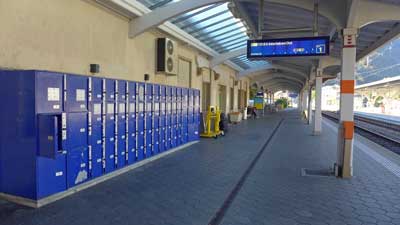
If you buy the Saver Day Pass at least 21 days in advance (and up to 60 days in advance) the 2023 cost is:
- 2nd Class (with Half Fare Card): CHF29
- 1st Class (with Half Fare Card): CHF82
- 2nd Class (with no Half Fare Card): CHF52
- 1st Class (with no Half Fare Card): CHF97
Once you research the normal cost of Swiss train fares you’ll see that the above prices are a very good deal for anyone riding more than 150 kilometers or so in a day. If you are just going, for example, from Zurich to Lucerne or Interlaken on a day, it’ll be cheaper to just buy that ticket individually. But if you are going from Geneva or Montreux to Interlaken or Lucerne then the Saver Day Pass will be much cheaper. Better still, you can use a Saver Day Pass to go from Interlaken to Geneva and back on the same day on the Goldenpass line and returning on the faster train through Bern, and it will still all be included for free.
If you don’t buy a Saver Day Pass at least 14 days in advance it’s more expensive, and if you only buy 1 to 3 days in advance it’s VERY expensive, so the key is to buy early. This is all confusing, but the Saver Day Pass should be a great option for many people only in Switzerland for one to three days.
Popular Swiss panorama scenic trains
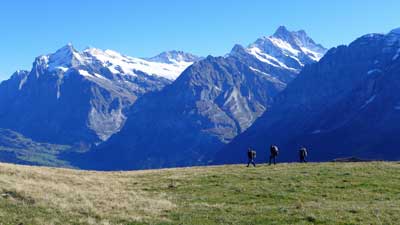
- Glacier Express
- Route: Zermatt to St. Moritz
- Train type: Panorama
- Journey time: 8 hours 3 minutes
- Distance: 291km
- 1st Class fare: CHF272
- 2nd Class fare: CHF159
- Compulsory seat reservation fee: CHF44 or 49
- Supplement for Swiss Pass holders: 13 to 33 for panorama carriage
- Bernina Express
- Route: Chur to Tirano and Lugano
- Train type: Panorama and bus
- Journey time: 4 hours 13 minutes and 3 hours 10 minutes
- Distance: 148km and 90km
- 1st Class fare: CHF113
- 2nd Class fare: CHF66
- Compulsory seat reservation fee: CHF32
- Supplement for Swiss Pass holders: 10 to 14 for panorama carriage
- GoldenPass Line
- Route: Lucerne to Montreaux
- Train type: Panorama
- Journey time: 5 hours 8 minutes
- Distance: 191 km
- Prestige Class fare: CHF131
- 1st Class fare: CHF96
- 2nd Class fare: CHF56
- Supplement for Swiss Pass holders: 8 to 15 for panorama carriage
- Gotthard Panorama Express (formerly Wilhelm Tell Express)
- Route: Lugano or Locarno to Lucerne
- Train type: Panorama and boat
- Journey time: 5 hours 21 minutes
- Distance: 182 km
- 1st Class fare: CHF164
- 2nd Class fare: CHF135
- Supplement for Swiss Pass holders: 39 to 49 for panorama carriage
- Swiss Chocolate Train
- Route: Montreux to Broc round trip
- Train type: Panorama or First Class
- Journey time: X hours X minutes
- Distance: 82 km
- 1st Class fare: CHF99
- 2nd Class fare: 89
- Supplement for Swiss Pass holders: 39
Popular Swiss scenic and theme trains
The scenic trains below are also extremely popular as sightseeing journeys rather than just as transportation, but can be used as both.
- Jungfraujoch round trip
- Route: Interlaken to Jungfraujoch
- Train type: special mountain train
- Journey time: 4 hours 41 minutes, round trip, plus time on top
- Distance: 73 km
- 1st Class fare: N/A
- 2nd Class fare: CHF224
- Supplement for Swiss Pass holders: 147 (so, a saving of CHF77)
- Gornergrat Railway
- Route: Gornergrat Railway
- Train type: Cog railway
- Journey time: 44 minutes return
- Distance: 10 km
- 1st Class fare: N/A
- 2nd Class fare: CHF90
- Supplement for Swiss Pass holders: 45
- Rigi round trip
- Route: Lucerne to Rigi
- Train type: Cog railway
- Journey time: 3 hours 25 minutes, plus time at the top
- Distance: 58 km
- 2nd Class fare: CHF78
- Supplement for Swiss Pass holders: None (this one is free with the pass)
- Mt Rigi Excursion (one-way and walk down)
- Route: Lucerne to Mt Rigi
- Train type: cogwheel train and/or cable car
- Journey time: 45 minutes up
- 1st Class fare: N/A
- 2nd Class fare: 49
- Supplement for Swiss Pass holders: 0
- Lotschberg Mountain Route and Centrovalli
- Route: Bern to Locarno
- Train type: Narrow gauge
- Journey time: 4 hours 40 minutes
- Distance: 212 km
- 1st Class fare: CHF158
- 2nd Class fare: CHF90
- Supplement for Swiss Pass holders: 5
- Jura round trip (Watchmaking Tour)
- Route: Neuchatel through Jura
- Train type: Regular
- Journey time: 3 hours 0 minutes
- Distance: 143 km
- 1st Class fare: CHF168
- 2nd Class fare: CHF108
- Supplement for Swiss Pass holders: 0
- Pre-Alpine Express
- Route: St. Gallen to Lucerne
- Train type: Regular
- Journey time: 2 hours 15 minutes
- Distance: 146 km
- 1st Class fare: CHF83
- 2nd Class fare: CHF47
- Supplement for Swiss Pass holders: 0
- Jura Foot Line
- Route: Basel to Geneva
- Train type: Regular
- Journey time: 2 hours 40 minutes
- Distance: 248 km
- 1st Class fare: CHF132
- 2nd Class fare: CHF75
- Supplement for Swiss Pass holders: 0
Popular Switzerland cable car rides
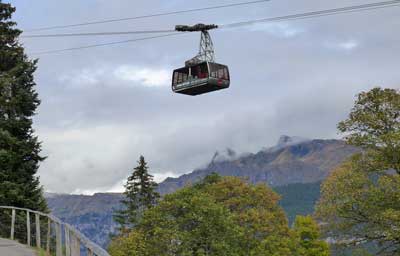
- Schilthorn
- Route: Stechelberg (Lauterbrunnen) to Schilthorn
- Train type: cable car
- Journey time: 1 hour
- 2nd Class fare: CHF108
- Supplement for Swiss Pass holders: 54
- Engelberg to Mt. Titlis cable car
- Route: Engelberg to Mt. Titlis
- Train type: cable car
- 2nd Class fare: CHF96
- Supplement for Swiss Pass holders: 46
The Swiss Travel Pass also includes free museum admission, but…
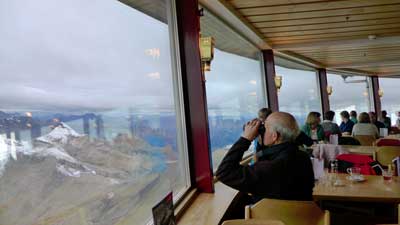
The problem is that the museums are only free on valid travel days, and almost no one would visit more than one or two museums with a Swiss Travel Pass. The trains and cable cars are so expensive that the pass gives very good value to cover those, so you don’t want to waste precious sightseeing time walking through a museum that only costs CHF10 anyway.
In other words, calculate the value of a Swiss Travel Pass on the travel savings only, and if you visit a museum here or there, then great. Most people are better off trying to squeeze in an additional train ride each day, and ignoring the museums. Switzerland is all about the outdoor scenery. As nice as the museums may be, they are not why you are there.
The pass includes free public transport in most Swiss cities
Similar to the free museum part of the offer, it’s best to ignore or minimize the value of free public transportation. It could be helpful in Zurich, but in most other Swiss tourist towns you won’t need much public transport. In fact, in Interlaken, each hotel or hostel guest automatically gets a card for free public transportation within the town (including between the two train stations).
So you might use a ride or two each day on public transport, but that won’t add up to much in terms of value of your Swiss Travel Pass.

Just want to say thank you Roger! I am currently doing the math to decide on the half fare card or swiss travel pass, with your input I am more confident we will do just fine riding the train and exclude the rent-a-car.
I always wanted to go to airport early for flights to avoid hussles (we are completely not aware of how to take trains as we seldom do in here at home so I opted for the car at first).
Just one last question if you don’t mind,again thank you.
In using both the HFC and swiss travel pass, do the line for ticketing the same as for same-day buyers/commuters. I am asking because I totally don’t have any idea
Lynn
Hi Roger,
Thank you for your very much appreciated input. It looks like we will use the Half Fare Pass, although we will change some of our itinerary. Yes, you are correct Lauterbrunnen is spectacular, we have spent some time in Interlaken and Jungfrau was top draw. We will arrive into Zurich from Nice/Monte Carlo after a 14 day cruise Barcelona to Monte Carlo so the wheels were turning. Add to this that we have hotel free nights to cover all of Zurich stay. Again, thank you for your valued input not only for us but many others.
Joe
Hi there,
First of all thank you very much for all the useful information on this blog!
I am doing a trip in July and really confused about all the information I am getting to process regarding travel in Switzerland! Normally my tentative plan is as per below:
Mon 6 July: Reach Zurich and take the train to Lauterbrunnen
Tues 7th: Day Trip to Jungfraujoch
Wed 8th: Visit Grindelwald and Murren
Thurs 9th: From Lauterbrunnen to Lucerne. Visit Lucerne during the day and in the evening take the train back to Zurich for the late evening flight
Now I am really confused because when I searched the sbb.ch website, I could see that a round trip from Zurich airport to Lauterbrunnen is around CHF160 and round trip from Lauterbrunnen to Jungfraujoch is around CHF 189. These 2 trips only amount to nearly CHF 350 without counting grindelwald. Is the half fare card a better deal then?
I also do not understand which routes are not covered by the pass because I thought it can be used everywhere without exception while I note that the Jungfraujoch route is only at 25% off. Is this also not covered by the pass? Also, does the Half Fare card cover 50% of this route?
Looking forward to hearing from you.
Thanks very much, Roger!
Kind Regards
Salakshi
Salakshi,
You are not alone in finding the Swiss rail system and its passes to be confusing, which I’m sure is why this article continues to be popular. Your plan sounds really great for a short visit like that.
You should definitely plan on getting the Half Fare Card and it DOES cover everything including Jungfraujoch, while the Swiss Travel Pass only does get you that 25% discount on Jungfraujoch. One reason it’s so confusing is that probably 98% of Swiss trains and cable cars are used as public transportation, and the other 2% or so are almost exclusively used by tourists. The Swiss Travel Pass covers that public transportation portion, but it only gives discounts on most of the tourist-only things.
For example, the cable car from the Lauterbrunnen Valley up to Schilthorn has 4 stages. The first two are short and go to Gimmelwald and then to Murren, are used by local residents as normal transportation so they are relatively cheap and fully covered by passes. But the last two much longer cable car sections that go up to the top are only used by tourists so they are expensive and only covered by discounts. This keeps things cheaper for Swiss citizens and it means tourists end up paying for the things they want to see, including Jungfraujoch, which exists only for sightseeing.
If you planned on doing other train rides the Swiss Travel Pass might be a better deal, and if you take the boat cruise and go up Mt Rigi in Lucerne the pass might be a better deal. And you might also go up Schilthorn instead of Jungfraujoch in the Interlaken area, as Schilthorn gets a 50% discount and it’s cheaper to begin with. But if you just do the things on your list I think the Half Fare Card is the better option.
I hope this answers your questions and let me know if you need any other help. -Roger
Fantastic site Roger! Just reading at how you put things together made Switzerland planning better as when I travel I like to plan ahead.
Here is mine so far and Ihope you can give me an advice which pass should I len towards buying.
Oct 3- arrival to zurich from California at 11am, then head from Zurich to Iseltwald for 4 night hotel stay, possible area visit at Iseltwald if time permits
Oct 4- Jungfraujoch then Lauterbrunnen valley walk
Oct 5- Schilthorn then Gimmelwld hike down
Oct 6- hop on hop off ferry boat ride to enjoy Lake Thun and Lake Brienz, drop by Harder Kulm, Interlaken or possible quick visit to Sigriswil
Oct 7- drive via rent a car from Interlaken to Zurich airport for a flight back at 145pm
I was thinking of buying the 4-day swiss travel pass, rent a car for a day, is my itinerary good for this?
Thank you, I appreciate it much!
I forgot to add, I’m travelling with my hubby and friend. I’m still debating whether to drive on arrival to interlaken or drive going to airport for our flight back home
Lynn,
Your itinerary looks really good. It’s hard to say for sure without adding everything up, but my hunch would be that the Half Fare Card might save you more money. A big part of that is that Jungfraujoch costs around US$200 and the Swiss Travel Pass only gets you a 25% discount compared to the Half Fare Card and its 50% discount. A Swiss Travel Pass is especially helpful for those taking multiple scenic (or longer) train trips as well as for things that are fully included such as Mt. Rigi (and Schilthorn until this year). But you appear to be taking quite a few shorter train trips and I think at half price those won’t add up to enough to pay for the Swiss Travel Pass.
I’m not sure if you have another motivation for renting a car to get back to the airport, but I’d recommend just taking the train and avoiding the hassle. At 50% off the train fare all the way to the airport won’t be too much either.
As I mention often, the only way to be really confident about these things would be to add up the prices of all the things you’d do and compare them with the cost of the Half Fare Card and Swiss Travel Pass to see what the lowest total would be. But again, I think the Half Fare Card is probably your best choice. Let me know if you have any other questions. -Roger
Hi Roger,
So much fantastic input from you, but still for us Seniors it is a bit of a crap shoot as to what to choose. However, my wife and I will arrive into Zurich August 12, 2020 We will stay four nights there and leave for St. Moritz for three nights before heading back to Zurich and overnight before heading back to New York August 20th. So we are looking at a tentative schedule of:
August 13th Zurich HB to Lucerne R/T
August 14th Zurich HB to Lausanne R/T
August 15th Zurich HB to Rhine Falls R/T
August 16th Zurich HB to St.Moritz
August 17th St.Moritz to Tirano R/T Bernina Express
August 19th St.Moritz to Zurich HB
August 18th will be local St.Moritz unless you can recommend a day trip from there.
Hope you can make heads and tails out of this brief itinerary and give us some much appreciated advise on what pass to buy or whatever, Thank you so much.
Joe Daly
Hi Joe,
I’m glad this has been helpful. First off, I really think you’d be better off staying in some of these other places for one or more nights. As discussed near the top of the main article on where to go in Switzerland, I really don’t recommend Zurich, even as a home base. Hotels there are very expensive (even compared to elsewhere in Switzerland) and it’s a pretty big city that is fairly dull compared to other big European cities. Also, in my opinion the most interesting part of Switzerland for scenery is the Lauterbrunnen Valley, which is next to Interlaken. It looks like you aren’t going to that area at all on your trip, unless you’ve been there before?
Also, Lausanne is another larger city without many notable sights. Most people agree that the magic of Switzerland is in the Alpine scenery, and the cities are mostly pretty dull even compared to similar cities in other countries.
That said, if you do the itinerary that you have here I think the Half Fare Card is probably your best choice. However, it also depends on what you’d do in each of these places. In Lucerne you can take the lake cruise and take a train up Mt. Rigi and take a cable car back down and all of that is covered by a Swiss Travel Pass. But if you just go to Lucerne to look at the Chapel Bridge and the lion sculpture and look around town, you wouldn’t need a Swiss Travel Pass. The same is true in all of your stops. The Bernina Express would be mostly covered by the Swiss Travel Pass and if you do enough covered things you might be best off getting an 8-day Swiss Travel Pass.
Most likely you’ll be best off getting a Half Fare Card and then buying a few Saver Day Passes for the specific days when you’d do the expensive things that are covered. Let me know if you have any other questions. -Roger
Hi Roger!
You are amazing!! I’m so sorry that I find your blog only now. There such a lot of perfect advice here. I’m stuck with my itinerary. I’m coming to Geneve 24.2 fo 8 days. I bought Swiss Pass for 25-28.2. I book a hotel in Bad Ragaz for 25.2 (I want to go to thermal bath there and to Liechtenstein). So I*m leaving Geneve to Bad Ragaz on morning 25.2. There are such a lot of things I’d love to do! Shilthorn is among them. I’m flying back from Geneve, so i should get closer to Geneve in the end of the journey. Would you recommend me please the best route? Thank you REALLY much! ELena
Elena,
I’m happy that this has been helpful, but I’m not sure about the question. Unfortunately I don’t know much about Bad Ragaz and people who’ve been to Liechtenstein generally find it pretty underwhelming so I haven’t been myself. If you are coming to Switzerland to see the scenic highlights then I’d spend at least a couple days in the Interlaken area and Schilthorn would be a major highlight. If you let me know more about what you need help with I will try to help more. -Roger
Hi Roger
Apologies as hit submit button by mistake earlier.
My husband and I will arrive in Zurich at 6.30am. 25th August. Our proposed itinerary is
Day 1 Train from Zurich Airport to Chur. 0/N Chur
Day 2 Glacier Express to Zermatt. O/N Zermatt
Day 3 Day trip to Matterhorn Glacier Paradise Station. O/N Zermatt
Day 4 Train to Geneva. O/N Geneva (staying with friends)
Day 5 Sightseeing Geneva with friends O/N Geneva
Day 6 Train to Montreux, sightseeing there. O/N Montreux
Day 7 Train (Golden Pass Line) to Lauterbrunnen, O/N Lauterbrunnen
Day 8 Jungfraujoch or Schilthorn O/N Lauterbrunnen
Day 9 Train to Lucerne O/N Lucerne
Day 10 Trip to Mt Rigi or similar O/N Lucerne
Day 11 Train to Zurich Airport for late flight to Belgrade
We live in Australia but I believe we can buy train tickets in advance but we are totally confused with all the different types of tickets on offer. We are both over 65, if that is relevant. Any advise would be greatly appreciated.
Thanks in advance, thanks for a great site and apologies again for messing up the earlier email
Cheers Shirley
Shirley,
I’m glad you found this helpful. Your itinerary looks pretty amazing. It’s always hard to be confident about these things without adding up the cost of each thing you’d do and comparing that cost with the cost of a pass or a Half Fare Card. But in your case my strong hunch would be that a 15-day Swiss Travel Pass would be the best value. It’s a shame to use a 15-day pass on an 11-day trip, but the per-day cost of a 15-day pass on an 11-day trip is a little under CHF50 per day and I’m pretty sure you’d be getting more value than that every day of your trip.
Better still, once you have the long Swiss Travel Pass you can use it as a travel planner and I’m sure you’ll find more included things that you can fit into your schedule. There are trains and cable cars and boat rides all over Switzerland and almost all of them are free with the travel pass. Unfortunately Switzerland doesn’t offer discounts for senior citizens, but on your trip you’ll be getting fantastic value out of just a normal adult 2nd Class pass. Let me know if you have any other questions. -Roger
Hello Roger,
Would you recommend a Swiss Travel Pass for the following itinerary:
1 Feb – Zurich Airport to Lucerne for 2 nights
(While in Lucerne we’re visiting the Swiss Army museum in Brunnen as well as hoping to do the Mt. Rigi round trip)
3 Feb – Lucerne to Interlaken for 2 nights
(While in Interlaken we hope to see Harder Kulum as well as see Grindelwald/Jungfraujoch; weather permitting. If not, I thought we could day trip to see Glasi Hergiswil)
5 Feb – Interlaken to Zermatt for 2 nights
(While there, the plan is to ski and/or enjoy some spa time)
7 Feb – Zermatt back to Zurich for 2 nights
(On our way back to Zurich we’d like to quickly stop in Andermatt for a few pictures before continuing on back to Zurich, then spend our remaining days seeing the city, walking mostly)
9 Feb – Zurich Airport
Jesse,
It’s difficult to say without adding up all of the prices of things you are planning on doing, but my strong guess would be that a Swiss Travel Pass for the 8 days would be your best value. You will be doing enough train trips and included attractions (such as Mt. Rigi) that it seems certain to save you the most money. It sounds like a fantastic trip. -Roger
Hello Roger,
Thanks for such a wonderful and informative blog about your Swiss travel experience. It was extremely helpful for us to chalk the skeleton of our first Swiss travel. My and my wife are planning to visit Switzerland from Paris for 8 days and need a tiny bit of your help in figuring out which Swiss travel pass should we buy or not. Below is our itinery so far:
1st May – Reach Basel from Paris. Then travel to INTERLAKEN (reach in evening)
2nd May – INTERLAKEN to JUNGFRAU (top of europe) and back
3rd May – INTERLAKEN to LAUTERBRUNNEN to Muren and Schilthorn(may be) and back
4th May – INTERLAKEN to GRINDELWALD to Mt. First and back
5th May – INTERLAKEN – Visit few sight seeing places nearly (may need some suggestions)
6th May – INTERLAKEN to LUCERNE – visit Old Town and Lake Lucerne
7th May – LUCERNE visit to Mount Pilatus/Mt Rigi
8th May – LUCERNE visit few nearby places or go somewhere near (may need some suggestions)
9th May – LUCERNE to Basel to catch a train to Paris
Also, feel free to suggest some other places that we missed, that can be included in the itinery.
Thanks,
Asmeen
Asmeen,
I’m glad this has been helpful and your itinerary looks great. The first thing I’d suggest would be to spend at least two nights in the Lauterbrunnen Valley itself. It’s only a 20-minute train ride from the Interlaken Ost (east) train station and the small villages in this area (Gimmelwald, Murren, Wengen, Grindelwald, and Lauterbrunnen itself) are endlessly charming and stunning. Interlaken (the city) is nice, but it’s kind of cheesy in some ways although it is convenient and you obviously have way more restaurant choices there. If you can stay 2 nights in Gimmelwald, which is by far the tiniest of the villages, it will be an unforgettable experience.
If you stay in Interlaken for all of those days you’ll be taking the Interlaken Ost to Lauterbrunnen train (leaves every 30 minutes) every day. In fact, you might even consider staying in two of the villages and then maybe 1 night in Interlaken itself.
As for specific suggestions for what to do in the Interlaken area and Lucerne, I have more information on my article about where to go in Switzerland as well as some hotel suggestions. Both places are FULL of great sights and it would take too long for me to create anything near a full list of them so I mainly stuck to the most famous sights.
For those staying 8 days I would almost always suggest a full 8-day Swiss Travel Pass, but in your case you don’t seem to be planning too many longer (and more expensive) train rides so it’s possible that a Half Fare Card could save you more.
What I’d probably do if I were you would be to plan on getting an 8-day Swiss Travel Pass and then use that to plan most of your sightseeing. As you know, Mt Rigi is fully included along with the lake cruise to get you there, and there are many other things that are also fully included (instead of just at a discount). Since you have so much time there you’ll easily be able to plan on loads of great attractions that will get you excellent value from a full pass. You’d not be able to use it on your arrival day or departure day if you spend 9 days there, so you’d just have to see which of those would cost less at full price. I hope this helps and let me know if you have any other questions. -Roger
Hello Roger, My family and I (6 people) will be travelling to Switzerland for 4 days in early-Feb, and we will be staying in Zurich for the whole period. I’m hoping to get your opinion on our itinerary which one do you prefer:
6 Feb – Arriving in Zurich -> Bern/Zermatt -> Zurich
7 Feb – Zurich -> Jungfraujoch -> Zurich
8 Feb – Zurich -> Mt. Titlis -> Zurich
9 Feb – Zurich -> Zurich Airport
or
6 Feb – Arriving in Zurich(City Tour)
7 Feb – Zurich -> Jungfraujoch/Zermatt -> Zurich
8 Feb – Zurich -> Mt. Titlis -> Zurich
9 Feb – Zurich -> Zurich Airport
Would you recommend us to buy Swiss Travel Pass or Swiss Half-Fare Pass?
Thank you.
Ivan.
Ivan,
If you started in Zurich in the morning it takes about 2.5 hours to reach the starting point of the Jungfraujoch railway, and then 5 or 6 hours on it, and then 2.5 hours back to Zurich. Going to Zermatt from Zurich takes about 3.5 hours so that is also a very long day trip, especially in February when the sun comes up late and sets early.
So given these choices I would save Zermatt for a future trip. Better still, if you aren’t locked into staying in Zurich I would recommend staying in Interlaken for at least 2 nights and Lucerne for at least one night. You can read more about all of that in my article on where to stay Switzerland.
If you do stay in Zurich then you’ll be taking many long train rides so the Swiss Travel Pass would probably more than pay for itself. If you are able to stay in the better places the Half Fare Card might make more sense. Let me know if you have any other questions. -Roger